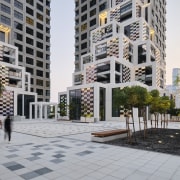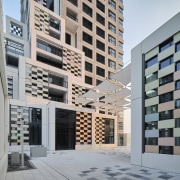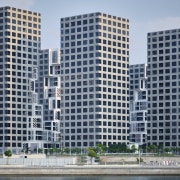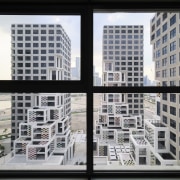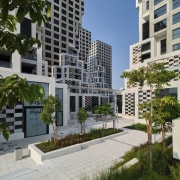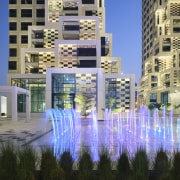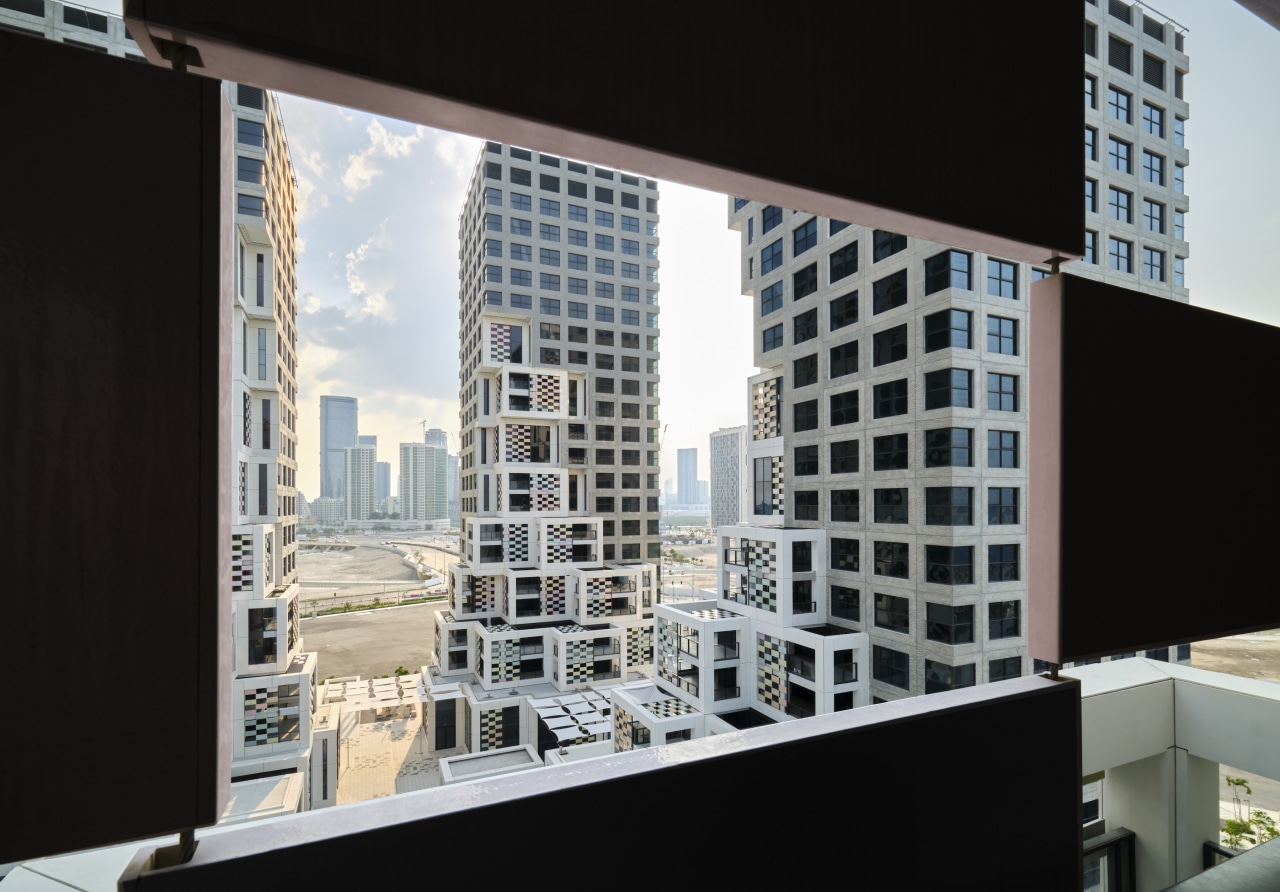Pearl of the Emirates
A 7-tower unit complex, by MVRDV, features a central plaza where the towers break down into terraces and bay windows with pastel screens, evoking the look of a pearl
Designed by MVRDV
From the architects:
Designed by MVRDV in Abu Dhabi, Pixel takes an innovative approach to designing residential complexes in the Emirates.
Comprising seven towers, the 85,000m² mixed-use development features 525 apartments together with shops, offices, and amenities.
Central to the design is the communal plaza at the heart of the development, where the seven towers 'break down' into formations of terraces and bay windows, complete with shading screens of tiles in 14 subtle pastel colours inspired by the appearance of a pearl.
Pixel is the first project completed in Makers District, a new development on Abu Dhabi’s Reem Island that developer Imkan bills as the new heart of Abu Dhabi – a creative counterpart to the city’s cultural hub on the nearby Saadiyat Island.
The design capitalises on the innovative, cosmopolitan spirit of Makers District to offer an approach to living that is rare in the United Arab Emirates – with an emphasis on identity and a strong sense of place, an outdoor lifestyle, community spirit, and modest yet striking materials.
The development forms a central hub in Maker’s District, so the design’s seven compact towers are pushed to the edge of the site, their positions and heights optimised to provide shade, encourage cooling breezes, and create connections with both the waterfront developments that surround the site on three sides and the beach.
Between the towers, a central plaza forms Pixel’s social centre, with restaurants, cafés, and shops soon to occupy the ground floor.
Community functions – from a gym and medical clinic to an early learning centre and offices for innovative start-ups – will occupy the level above, ensuring that the buildings that make up Pixel are always active, and that the plaza is therefore lively throughout the day.
The façades facing this plaza are what truly bring the project to life.
At their bases, the towers crumble into 'pixels', spilling out into the plaza to create terraces and bay windows.
These extend the living spaces inside into the public realm, encouraging residents to enjoy the outdoors in the cooler months of the year.
Water and green features in the plaza below help to cool the microclimate within the plaza, making for a more comfortable environment outdoors, with planned green roofs being added to the top of the pixels.
Life in the apartments above blends with the life in the plaza, giving a sense of place to the project, and an identity which helps it stand out from other complexes in the Emirates.
This identity is further reinforced by the materials used on the project that, despite a certain modesty, nonetheless grab the attention of passers-by.
In a nod to Abu Dhabi’s heritage, the development is envisaged as an oyster, with a hard outer shell that sequesters a delicate pearl inside.
The outer façades are made of concrete panels, imprinted with a graphic pattern designed by artist Nicole Martens that was inspired by oyster shells.
Glimpsed between the towers, the shading screens of the central plaza, clad in tiles of 14 different pastel colours, give the impression of a pearl inside the shell.
On the interior, this modest yet joyful approach to materials continues, with each tower adopting a colour profile that gives it a unique identity and helps to improve wayfinding from the car park below ground.
Pixel's 525 apartments are of varying sizes, ranging from studios to spacious three-bedroom homes.
These apartments are arranged in a way that celebrates diversity, mixing more expensive units and more affordable spaces together.
This is enabled by the pedestrian plaza which, with its vibrant atmosphere, offers a benefit to living on the lower levels and makes these apartments just as desirable as those nearer to the tops of the towers.
As a result, the project encourages contact between people from different walks of life – expats and Abu Dhabi locals, large families and singles living alone, the young and the old.
MVRDV founding partner Jacob van Rijs says that Pixel challenges the residential typologies that have become the norm in the UAE.
“Instead of nondescript, isolated towers made palatable by a veneer of luxury finishes on the interior, Pixel makes it possible for residents to spend some time outdoors, become friends with their neighbours, to invite visitors for a meal in the restaurant in the plaza," he says.
"It encourages a way of life that is not only enjoyable, but environmentally and socially more sustainable than the alternatives.”
Credit list
Project
Architect of record
Engineering and Project Management
Infrastructure
Landscape and public realm design
Wayfinding & signage
Security
Helpful links
Windows and Doors
Cabinetry Hardware
Spas
Home Builder
Roofing
Heating
Flooring
Taps
Kitchen Design
Home Design
Home kitchen bathroom commercial design
Classic looks, contemporary efficiency
Diving into nature
Personality plus
Commercial Design Trends 40-2C
Keep up to date with what's happening in the commercial office, retail, hospitality, education market sectors and more, ...
Read More

